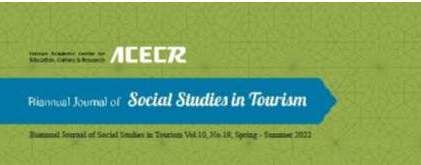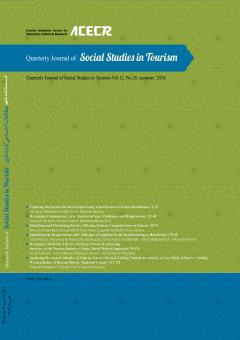Analyzing Ideological Attitudes of Modern Tourists Towards Visiting Natural Attractions: A Case Study of Tourists Visiting Western Kalate of Bastam District, Shahrood County
Subject Areas :tahereh sadeghloo 1 * , fahimeh jafari 2 , fahimeh karimiyan 3
1 - Associate Professor, Department of Geography, Ferdowsi University of Mashhad, Mashhad, Iran
2 - Ph.D. Student in Geography and Rural Planning, Ferdowsi University of Mashhad, Mashhad, Iran
3 - Senior Expert in Geography and Rural Planning, Ferdowsi University of Mashhad, Mashhad, Iran
Keywords: Ideological Attitude, Nature Tourism, Tourist Behavior, Environmental Protection, Shahrood County ,
Abstract :
This applied study sought to investigate the ideological bases and theoretical attitudes of tourists of modern tourists towards the environment and their behavior in this regard using a descriptive-analytical approach. The unit of analysis is the tourists who visited the Kharghan and Western Kalateh districts in Bastam district, Shahrood County. Due to the lack of accurate information on the number of tourists visiting the study area, the current study used Cochran's formula (applied in cases of unknown communities) to determine the sample size of the study. Accordingly, 140 tourists were selected, to whom a relevant questionnaire was administered. The results of the study indicated that the aesthetic-mental attitude of the tourists towards nature (with an average of 4.78) exerted the greatest influence on their behavior towards the environment, suggesting that most of the tourists do not seek economic benefits in visiting tourist areas. In other words, the tourists do not follow a utilitarian attitude in visiting nature. Moreover, the results revealed that the attitudes of professional tourists (those who are actively engaged in tourism) towards nature differ from those of non-professional tourists. According to the results of the t-test performed on two independent samples, women and men possess different ideological attitudes towards nature, making them behave differently towards the natural environment. Furthermore, a positive direct correlation was found between age and the ideological attitudes of tourists towards nature, indicating that the attitude towards nature changes with an increase in age, which in turn affects the behavior of tourists towards the environment.
احسانی، امیر هوشنگ و محمدی نهوجی، مقداد. (1390). «برنامه¬ریزی و اکوتوریسم پایدار مناطق بیابانی (مطالعه موردی: استان اصفهان)»، دانشگاه آزاد واحد اسلامشهر، دومین همایش ملی جغرافیا و برنامه¬ریزی شهری؛ فضای جغرافیایی، رویکرد آمایشی و مدیریت محیط، صص 97- 106.
عابدی سروستانی، احمد؛ شاه ولی، منصور و محقق داماد، سید مصطفی. (1386). «ماهیت و دیدگاه¬های اخلاق زیست محیطی با تأکید بر دیدگاه اسلامی». اخلاق در علوم و فن آوری، 2 (1): 59- 72.
افراخته، حسن. (1387). مقدمه¬اي بر برنامه¬ريزي سكونتگاه¬هاي روستايي، تهران: گنج هنر.
افراخته، حسن، خدایی، بهرام، علی. (1390). «ساماندهي گردشگري در تفرجگاه¬هاي پيراشهري هماهنگ با ظرفيت تحمل محيطي»، نشریه تحقیقات کاربردی علوم جغرافیایی دانشگاه تربیت معلم، 17 (20): 69-88.
بدری، علی؛ بیات، ناصر؛ فتاحی، احدالله؛ عبدی، ناصر و باقری، فاطمه. (1394). «بخش¬بندی گردشگران روستایی بر اساس انگیزه¬های گردشگری (مطالعه موردی: دهستان سروستان، شهرستان بوانات)»، پژوهش¬های جغرافیای انسانی، 47 (4): 773- 787.
بنسون، جان. (1382). اخلاق محیط¬زیست، مجموعه مقالات و بررسی¬ها؛ ترجمه عبدالحسین وهاب زاده، انتشارات جهاد دانشگاهی مشهد، چاپ اول.
تاج زاده نمین، ابوالفضل. (1383). «نگرشی بر جایگاه فرهنگ و ضوابط اخلاقی در گردشگری»، فصلنامه مطالعات جهانگردی، 2 (5): 1- 26.
جمعه پور، محمود و نماینده، علی. (1391). «ارزیابی راهبردی توا¬ن¬های اکوتوریستی و ظرفیت برد گردشگری کویر مرنجاب کاشان»، مجله پژوهش و برنامه¬ریزی روستایی، 1 (1): 45-71.
خوش فر، غلامرضا، الحی، صادق و امام قلی، لقمان. (1389). بررسی رفتار مردم نسبت به محیط زیست (مطالعه موردی: مناطق شهری و روستایی استان کردستان)، چهارمین همایش و نمایشگاه تخصصی مهندسی محیط زیست، تهران، https://civilica.com/doc/93228.
داوودی، زینب، ذبیحی، حسین. (1394). «بررسی و نقش اکوتوریسم به عنوان رویکردی نوین در توسعه صنعت گردشگری و بهره¬گیری از آن در طراحی مجموعه¬های اقامتی- توریستی (مورد مطالعه: منطقه 22 تهران)»، مطالعات آینده¬پژوهی و سیاست-گذاری، 1 (1): 33-43.
دلیر، الهه. (1397). ببین رابطه اخلاق سبز و رفتار اکولوژیکی مصرف خانوارهای روستایی(مطالعه موردی: شهرستان خواف)، پایان-نامه کارشناسی ارشد، دانشکده ادبیات و علوم انسانی گروه جغرافیا.
رحیمی، داریوش و رنجبردستنانی، محمود. (1391). «ارزیابی و اولویت¬بندی جاذبه¬های اکوتوریسم، روستاهای هدف گردشگری استان چهارمحال بختیاری»، مجله مطالعات و پژوهش¬های شهری و منطقه¬ای، 4 (14): 131-150.
رضوانی، علی اصغر. (1380). «نقش اکوتوریسم در حفاظت محیط زیست»، فصلنامه محیط شناسی، 29 (122): 31-115.
رمضان نژاد، یاسر و رکن الدین افتخاری، عبدالرضا. (1396). «ارزیابی فرهنگ محیط زیستی جامعه در مقاصد گردشگری ساحلی روستایی استان گیلان»، مجله جغرافیای انسانی نواحی ساحلی، 1 (1): 37-56.
زاهدی، محمد و بهرام رنجبریان. (1391). شناخت گردشگری، نشر چهارباغ، چاپ اول.
قدوسی¬فر، سید هادی؛ حبیب، فرح و مهتیام شهبازی. (1391). «حکمت خالده و جایگاه طبیعت در جهان بینی و معماری معابد ادیان مختلف»، باغ نظر، 9 (20): 50-37.
شاه ولی، منصور و قاسمی، علی اصغر. (1396). «تببین پارادایم توحیدی آموزش صیانت از منابع طبیعی و محیط زیست»، پژوهش¬های اخلاقی، 7 (4): 1-18.
شبیری، سیدمحمد؛ شمسی پاپکیاده، سیده زهرا و ابراهیمی، هادی. (1392). «اثرات اجرای برنامه¬های آموزش زیست محیطی بر طبیعت¬گردی (مورد مطالعه : دانش¬آموزان مدارس لنگرود)»، مجله برنامه¬ریزی و توسعه گردشگری، 2 (7): 162-148.
شیرخدایی، میثم؛ علیزاده ثانی، محسن و آملی دیوا، فهیمه. (1395). «بررسی تصویر مقصد بر رضایت و مقاصد رفتاری در گردشگری سلامت (مورد مطالعه: آبگرم معدنی لاویج)»، مجله برنامه¬ریزی و توسعه گردشگری، 5 (17): 128-145.
قدیری معصوم، مجتبی؛ استعلاجی، علیرضا و پازکی، معصومه. (1394).گردشگری پایدار روستایی و عشایری، انتشارات دانشگاه تهران، چاپ اول.
کاظمی نسب، حسن و نیکنامی، مهرداد. (1394). اثرات طبیعت¬گردی بر محیط¬زیست؛ فرصت¬ها و تهدیدها، همایش ملی گردشگری، جغرافیا و محیط زیست پاک، دانشگاه بوعلی سینا همدان، اردیبهشت 94، صص1-10.
رضوانی، محمدرضا و لباف خانیکی، مجید. (1393). «اخلاق گردشگری مدرن رویکردی انتقادی به ابعاد، اصول و آثار اخلاق گردشگری مدرن»، گردشگری شهری ، 1 (1): 47- 61.
شریفی، مرتضی؛ مخدوم، مجید؛ قوام الدین، زاهدی امیری و سبحانی، هوشنگ. (1385). «ایجاد مدل طیف قابلیت اکولوژیکی بهره¬وری انسان از پارک¬ها و مناطق حفاظت شده»، محیط شناسی بهار، شماره 39، 118- 101.
مشهدی، علی، فهیمی، عزیز الله. (1388). «ارزش ذاتی و ارزش ابزاری در فلسفه محیط زیست (از رویکردهای فلسفی تا راهبردهای حقوقی)»، فصلنامه علمی- پژوهشی دانشگاه قم، 7 (3): 195-216.
مصطفوي، حکیمه؛ گوشکی شمسی، احسان و عباسی، محمود. (1391). «اخلاق در گردشگری سلامت»، فصلنامه اخلاق زیستی، 2 (4): 161-180.
نبوی، سید عبدالحسین و شهریاری، مرضیه. (1393). «دین، اخلاق و محیط زیست»، فصلنامه انسان و محیط زیست، شماره 29، صص 69 -84.
ولی زاده، ناصر و بیژنی، مسعود. (1395). «تحلیل مؤلفه¬هاي مؤثر بر نگرش زیبایی شناسی محیط زیستی از دیدگاه روستاییان شهرستان میاندوآب»، مجله تحقیقات اقتصاد و توسعه کشاورزي ایران، 2 (3): 719-730.
Althusser, L. (1969). For Marx: New York: Pantheon Books.
Andereck, K. L., & Vogt, C. A. (2000). The relationship between residents’ attitudes toward tourism and tourism development options. Journal of Travel Research, 39(1): 27-36.
Ap, J. (1992). Residents' perceptions on tourism impacts. Annals of Tourism Research, 19(4): 665-690.
Barr, S. (2003). Strategies for sustainability: citizens and responsible environmental behavior, AREA, 35 (3): 227-240
Basri, M. H. (2013). Green Consumption: Searching For Religious Ethics Of Consumption, AL ALBAB - Borneo Journal of Religious Studies (BJRS), 2 (22): 249-256.
Baysan, S. (2001). Perceptions of the environmental impacts of tourism: A comparative study of the attitudes of German, Russian and Turkish tourists in Kemer, Antalya, Tourism Geographies 3(2): 281-235.
Berman, M. G., Kross, E., Krpan, K. M., Askren, M. K., Burson, A., Deldin, P. J., & Jonides, J. (2012). Interacting with nature improves cognition and affects individuals with depression. Journal of Affective Disorders, 140 (3): 300-305.
Borhani, F., Pourezzat, A. A., & Ehsani, A. H. (2024). Spatial Distribution of Particulate Matter in Iran from Internal Factors to the Role of Western Adjacent Countries from Political Governance to Environmental Governance. Earth Systems and Environment, 8(1), 135-164.
Borhani, F., Shafiepour Motlagh, M., Ehsani, A. H., Rashidi, Y., Ghahremanloo, M., Amani, M., & Moghimi, A. (2023). Current status and future forecast of short-lived climate-forced ozone in Tehran, Iran, derived from ground-based and satellite observations. Water, Air, & Soil Pollution, 234(2), 134.
Carrete, L., Castaño, R., Felix, R., Centeno, E., González, Eva. (2012). Green consumer behavior in an emerging economy: confusion, credibility, and compatibility, Journal of Consumer Marketing, 29 (7): 470-481,
Fennell, D., (2006). The Ethics of Excellence in Tourism Research, Journal of Travel Research, 52(4):
Franco, D., Franco, D., Mannino, I., & Zanetto, G. (2003). The impact of agroforestry networks on scenic beauty estimation: the role of a landscape ecological network on a socio-cultural process. Landscape and Urban Planning, 62(3): 119-138.
Gifford, R. (2014). Environmental psychology matters. Psychology, 65(1), 541.
Gunn, C. A. (2002) Tourism planning: basics, concepts, cases: 4th Edition. Taylor and Francis, London, ISBN 0-415-93268-8, ISBN 0-415-93269-6 (pbk).
Holden, A., (2009). THE ENVIRONMENT-TOURISM NEXUS: Influence of Market Ethics, Annals of Tourism Research, 36 (3): 373-389,
Kamitsis, I., & Francis, A. J. (2013). Spirituality mediates the relationship between engagement with nature and psychological well-being. Journal of Environmental Psychology, 36, 136-143.
Monostori, K., and Horich, B. (2008). Studies environmental awareness: Attitude or action?. Journal of Review of Sociology, 14 (2), 5-31.
Parrinllo’G.L. (1998). Motivation and Anticipation in Post-Industrial Tourism, Annals of Tourism Research, 20 (3): 233, 234.
Peattie, F. (2010). Green Consumption Behavior& Norms, Annual Review of Environment and Resources, Vol. 35 (13):195-228
Porteous, J. D. (2013). Environmental aesthetics: ideas, politics, and planning. Routledge.
Servidio, R. Nicoletta, R. (2012). Tourists' opinions and their selection of tourism destination images: An affective and motivational evaluation, Tourism Management Perspectives, 4:19-27.
Sojasi Qeidari, H, Mahmoodi, H, Jafari, F. (2017). An Analysis of Entrepreneurial Skills of Women in Rural Areas: A Case Study of Villages in Central District of Fariman, Journal of Rural Research 8 (2), 242-263
T O'Riordan, T. (1977). Environmental ideologies, School of Environmental Sciences, The University of East Anglia, Norwich, England, Environment and Planning, 12 (9): 3-14.
Zhang, J. W., Howell, R. T., & Iyer, R. (2014). Engagement with natural beauty moderates the positive relationship between connectedness with nature and psychological well-being. Journal of Environmental Psychology, 38: 55-63.

